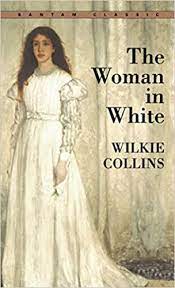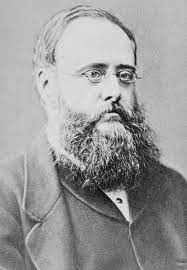The Woman in White Page #15
The Woman in White is Wilkie Collins's fifth published novel, written in 1859. It is a mystery novel and falls under the genre of "sensation novels". The story is an early example of detective fiction with protagonist Walter Hartright employing many of the sleuthing techniques of later private detectives
always strongest in the most contradictory manner, when she looked at me; or, in other words, when I was most conscious of the harmony and charm of her face, and yet, at the same time, most troubled by the sense of an incompleteness which it was impossible to discover. Something wanting, something wanting--and where it was, and what it was, I could not say. The effect of this curious caprice of fancy (as I thought it then) was not of a nature to set me at my ease, during a first interview with Miss Fairlie. The few kind words of welcome which she spoke found me hardly self-possessed enough to thank her in the customary phrases of reply. Observing my hesitation, and no doubt attributing it, naturally enough, to some momentary shyness on my part, Miss Halcombe took the business of talking, as easily and readily as usual, into her own hands. "Look there, Mr. Hartright," she said, pointing to the sketch-book on the table, and to the little delicate wandering hand that was still trifling with it. "Surely you will acknowledge that your model pupil is found at last? The moment she hears that you are in the house, she seizes her inestimable sketch-book, looks universal Nature straight in the face, and longs to begin!" Miss Fairlie laughed with a ready good-humour, which broke out as brightly as if it had been part of the sunshine above us, over her lovely face. "I must not take credit to myself where no credit is due," she said, her clear, truthful blue eyes looking alternately at Miss Halcombe and at me. "Fond as I am of drawing, I am so conscious of my own ignorance that I am more afraid than anxious to begin. Now I know you are here, Mr. Hartright, I find myself looking over my sketches, as I used to look over my lessons when I was a little girl, and when I was sadly afraid that I should turn out not fit to be heard." She made the confession very prettily and simply, and, with quaint, childish earnestness, drew the sketch-book away close to her own side of the table. Miss Halcombe cut the knot of the little embarrassment forthwith, in her resolute, downright way. "Good, bad, or indifferent," she said, "the pupil's sketches must pass through the fiery ordeal of the master's judgment--and there's an end of it. Suppose we take them with us in the carriage, Laura, and let Mr. Hartright see them, for the first time, under circumstances of perpetual jolting and interruption? If we can only confuse him all through the drive, between Nature as it is, when he looks up at the view, and Nature as it is not when he looks down again at our sketch-books, we shall drive him into the last desperate refuge of paying us compliments, and shall slip through his professional fingers with our pet feathers of vanity all unruffled." "I hope Mr. Hartright will pay ME no compliments," said Miss Fairlie, as we all left the summer-house. "May I venture to inquire why you express that hope?" I asked. "Because I shall believe all that you say to me," she answered simply. In those few words she unconsciously gave me the key to her whole character: to that generous trust in others which, in her nature, grew innocently out of the sense of her own truth. I only knew it intuitively then. I know it by experience now. We merely waited to rouse good Mrs. Vesey from the place which she still occupied at the deserted luncheon-table, before we entered the open carriage for our promised drive. The old lady and Miss Halcombe occupied the back seat, and Miss Fairlie and I sat together in front, with the sketch-book open between us, fairly exhibited at last to my professional eyes. All serious criticism on the drawings, even if I had been disposed to volunteer it, was rendered impossible by Miss Halcombe's lively resolution to see nothing but the ridiculous side of the Fine Arts, as practised by herself, her sister, and ladies in general. I can remember the conversation that passed far more easily than the sketches that I mechanically looked over. That part of the talk, especially, in which Miss Fairlie took any share, is still as vividly impressed on my memory as if I had heard it only a few hours ago. Yes! let me acknowledge that on this first day I let the charm of her presence lure me from the recollection of myself and my position. The most trifling of the questions that she put to me, on the subject of using her pencil and mixing her colours; the slightest alterations of expression in the lovely eyes that looked into mine with such an earnest desire to learn all that I could teach, and to discover all that I could show, attracted more of my attention than the finest view we passed through, or the grandest changes of light and shade, as they flowed into each other over the waving moorland and the level beach. At any time, and under any circumstances of human interest, is it not strange to see how little real hold the objects of the natural world amid which we live can gain on our hearts and minds? We go to Nature for comfort in trouble, and sympathy in joy, only in books. Admiration of those beauties of the inanimate world, which modern poetry so largely and so eloquently describes, is not, even in the best of us, one of the original instincts of our nature. As children, we none of us possess it. No uninstructed man or woman possesses it. Those whose lives are most exclusively passed amid the ever-changing wonders of sea and land are also those who are most universally insensible to every aspect of Nature not directly associated with the human interest of their calling. Our capacity of appreciating the beauties of the earth we live on is, in truth, one of the civilised accomplishments which we all learn as an Art; and, more, that very capacity is rarely practised by any of us except when our minds are most indolent and most unoccupied. How much share have the attractions of Nature ever had in the pleasurable or painful interests and emotions of ourselves or our friends? What space do they ever occupy in the thousand little narratives of personal experience which pass every day by word of mouth from one of us to the other? All that our minds can compass, all that our hearts can learn, can be accomplished with equal certainty, equal profit, and equal satisfaction to ourselves, in the poorest as in the richest prospect that the face of the earth can show. There is surely a reason for this want of inborn sympathy between the creature and the creation around it, a reason which may perhaps be found in the widely-differing destinies of man and his earthly sphere. The grandest mountain prospect that the eye can range over is appointed to annihilation. The smallest human interest that the pure heart can feel is appointed to immortality. We had been out nearly three hours, when the carriage again passed through the gates of Limmeridge House. On our way back I had let the ladies settle for themselves the first point of view which they were to sketch, under my instructions, on the
Translation
Translate and read this book in other languages:
Select another language:
- - Select -
- 简体中文 (Chinese - Simplified)
- 繁體中文 (Chinese - Traditional)
- Español (Spanish)
- Esperanto (Esperanto)
- 日本語 (Japanese)
- Português (Portuguese)
- Deutsch (German)
- العربية (Arabic)
- Français (French)
- Русский (Russian)
- ಕನ್ನಡ (Kannada)
- 한국어 (Korean)
- עברית (Hebrew)
- Gaeilge (Irish)
- Українська (Ukrainian)
- اردو (Urdu)
- Magyar (Hungarian)
- मानक हिन्दी (Hindi)
- Indonesia (Indonesian)
- Italiano (Italian)
- தமிழ் (Tamil)
- Türkçe (Turkish)
- తెలుగు (Telugu)
- ภาษาไทย (Thai)
- Tiếng Việt (Vietnamese)
- Čeština (Czech)
- Polski (Polish)
- Bahasa Indonesia (Indonesian)
- Românește (Romanian)
- Nederlands (Dutch)
- Ελληνικά (Greek)
- Latinum (Latin)
- Svenska (Swedish)
- Dansk (Danish)
- Suomi (Finnish)
- فارسی (Persian)
- ייִדיש (Yiddish)
- հայերեն (Armenian)
- Norsk (Norwegian)
- English (English)
Citation
Use the citation below to add this book to your bibliography:
Style:MLAChicagoAPA
"The Woman in White Books." Literature.com. STANDS4 LLC, 2025. Web. 23 Jan. 2025. <https://www.literature.com/book/the_woman_in_white_1567>.




Discuss this The Woman in White book with the community:
Report Comment
We're doing our best to make sure our content is useful, accurate and safe.
If by any chance you spot an inappropriate comment while navigating through our website please use this form to let us know, and we'll take care of it shortly.
Attachment
You need to be logged in to favorite.
Log In